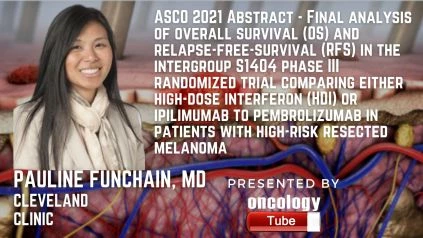Pauline Funchain, MD, Medical Oncologist/Cancer Genomics at Cleveland Clinic speaks about the ASCO 2021 Abstract – Final analysis of overall survival (OS) and relapse-free-survival (RFS) in the intergroup S1404 phase III randomized trial comparing either high-dose interferon (HDI) or ipilimumab to pembrolizumab in patients with high-risk resected melanoma.
Link to Abstract –
https://meetinglibrary.asco.org/record/195948/abstract
Background information:
We wanted to see if adjuvant pembrolizumab, administered for a year, would enhance OS and RFS compared to high-dose ipilimumab (ipi10) or HDI, the two FDA-approved adjuvant therapies for high-risk resected melanoma at the time.
Methodologies:
Patients with resected stages IIIA(N2), B, C, and IV who were 18 years or older were eligible. Patients with CNS metastases were not allowed to participate. Patients must have had thorough staging and appropriate surgery to be clear of melanoma at the time of enrollment, including full lymph node dissection for those with sentinel node positive disease. Prior PD-1 inhibition, ipilimumab, or interferon treatment was not permitted. Based on stage, PD-L1 status (positive, negative, or unknown), and the desired control arm, two treatment arms were allocated (HDI vs. Ipi10). Patients were randomized 1:1 to either the control arm [(1) interferon alfa-2b 20 MU/m2 IV days 1-5, weeks 1-4, followed by 10 MU/m2/d SC days 1, 3, and 5, weeks 5-52 (n=190), or the experimental arm [pembrolizumab 200 mg IV q3w for 52 weeks (n=648)] or the experimental arm [ipilimumab 10 mg/kg IV q3w for 4 doses, then RFS among all patients, OS among all patients, and OS among patients with PD-L1+ baseline biopsies were the three primary comparisons in the research. Results: A total of 1,426 patients were tested, with 11 percent, 49 percent, 34 percent, and 6 percent of them being assigned to AJCC7 stage IIIA(N2), IIIB, IIIC, and IV, respectively. With 512 RFS and 199 OS events, this final analysis was completed per-protocol 3.5 years after the last patient was randomized. When compared to the control group (pooled HDI and ipi10), the pembrolizumab group demonstrated a statistically significant improvement in RFS (HR 0.740). (99.618 percent CI, 0.571 to 0.958). There were no statistically significant improvement in OS in the 1,303 eligible randomized general patient group (96.3 percent CI, 0.622 to 1.297), or in the 1,070 (82 percent ) patients with PD-L1 positive baseline biopsies (96.3 percent CI, 0.622 to 1.297). (97.8 percent CI, 0.604 to 1.291). HDI 69/9/0 percent, ipi10 43/5/0.5 percent, and pembrolizumab 17/2/0.3 percent were the event rates in grades 3/4/5.
Final Thoughts:
In the adjuvant therapy of individuals with high-risk resected melanoma, pembrolizumab improves RFS but not OS when compared to HDI or ipi10. Pembrolizumab, as opposed to HDI or Ipi10, is a better-tolerated adjuvant therapy regimen. NIH/NCI NCTN grants CA180888, CA180819, CA180820, CA180863; Merck Sharp & Dohme Corp., a subsidiary of Merck & Co., Inc., Kenilworth, NJ, USA; and Merck Sharp & Dohme Corp., a subsidiary of Merck & Co., Inc., Kenilworth, NJ, USA. Acknowledgments to the editors: Special thanks to Elad Sharon, MD, MPH, and Larissa Korde, MD, MPH, National Cancer Institute, Investigational Drug Branch, as well as Nageatte Ibrahim, MD, and Sama Ahsan, MD, Merck, for their contributions to this experiment. NCT02506153 is the number for the clinical trial.

